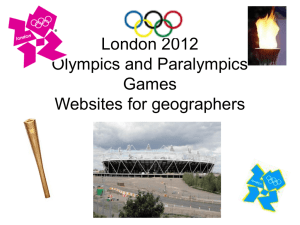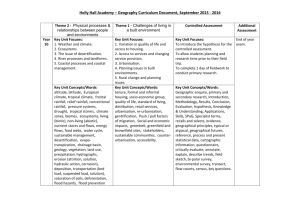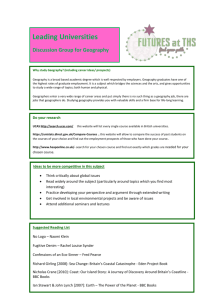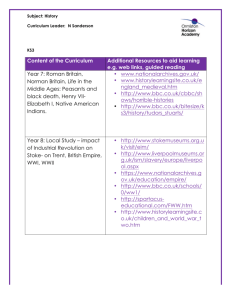Student Handbook Controversial issues…
advertisement
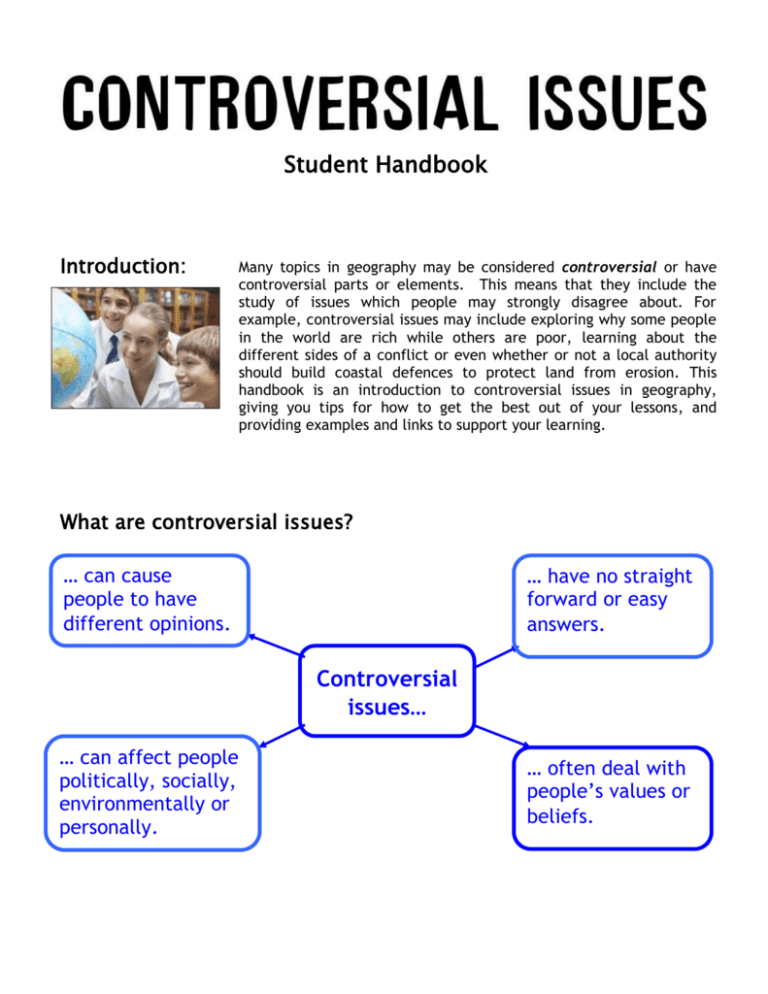
Student Handbook Introduction: Many topics in geography may be considered controversial or have controversial parts or elements. This means that they include the study of issues which people may strongly disagree about. For example, controversial issues may include exploring why some people in the world are rich while others are poor, learning about the different sides of a conflict or even whether or not a local authority should build coastal defences to protect land from erosion. This handbook is an introduction to controversial issues in geography, giving you tips for how to get the best out of your lessons, and providing examples and links to support your learning. What are controversial issues? … can cause people to have different opinions. … have no straight forward or easy answers. Controversial issues… … can affect people politically, socially, environmentally or personally. … often deal with people’s values or beliefs. How can you get the best out of studying controversial issues? Studying controversial issues often involves some discussion and debate. There are a few ground rules that you should follow at these times to ensure that you and your classmates get the best out of your lessons: You should… Listen carefully to other students and respect their views. Never speak at the same time as another student. Try not to monopolize the debate – give others a chance to speak their opinions. Be open to the opinion of others – just because it isn’t the same opinion as you, doesn’t mean it isn’t a good point! Try to think ‘why’ you have an opinion. Respect other pupils who do not wish to give their view – some students may find some issues too private or painful to share. Use appropriate language – other pupils will not respect you if you are rude or use inappropriate language. How will your teacher handle controversial issues? Sometimes, a controversial issue will pop up during a lesson which means that a discussion or debate begins. Your teacher will encourage your class to share a variety of views. However, he or she will also try to ensure that you receive a balanced view of the issues by playing ‘devil’s advocate’. This doesn’t mean that these are necessarily your teacher’s personal views. . Your teacher may also give his or her personal views as a citizen rather than teacher, but will say so. It is up to you to make up your mind about what you think about the issues from the evidence. You may find that you don’t really have enough information to make up your mind. Therefore, you should try and research more about it. This handbook provides some extra links to aid you in this research. Examples of controversial geographical issues that you might study: Module The geography of conflict Who wants to be a billionaire? Africa: a continent of contrasts The geography of my stuff Impossible places Who do we think we are? Controversial issues Why conflicts happen and their impacts Wealth is unevenly spread in the world People have conflicting perceptions of Africa Linking British teenagers with producers of your stuff in other countries Should we build in fragile environments? Exploring identity and a sense of place The next section of this handbook gives you background information about four of these topics, along with additional links and some extension activities to support your studies. 1. The Geography of Conflict In this module you will learn about modern day conflicts as well as conflicts in the past. The module also links with some of the work you might be doing in your history lessons. The following resources are designed to give you extra information to support your studies on conflict. To find out more about conflicts: For more information about today’s world conflicts, search the maps, news articles and slides shows on the World Conflicts Today website: www.worldconflictstoday.com/ To support your studies on and to learn more about the conflict in Darfur (Sudan), read this Q&A section on the BBC Newsround website: http://news.bbc.co.uk/cbbcnews/hi/world/newsid_3792000/3792713.stm To find out more about climate change and conflict in Sudan, read these two articles ‘Darfur conflict heralds era of wars triggered by climate change, UN report warns’: http://www.guardian.co.uk/environment/2007/jun/23/sudan.climatechange, and ‘Sudan ‘must address climate ills’’: http://news.bbc.co.uk/1/hi/world/africa/6230616.stm This news clip highlights the water issues in Sudan – ‘Water find ‘may end Darfur war’’: http://news.bbc.co.uk/1/hi/world/africa/6904318.stm To support your understanding of the Treaty of Versailles take a look at the History Learning site: http://www.historylearningsite.co.uk/treaty_of_versailles.htm and the First World War site: http://www.firstworldwar.com/source/versailles.htm Extension: Write a poem focusing on one of the following: a) Climate change and conflict in Sudan b) How geography has shaped the nature of war in Iraq 2. Who wants to be a billionaire? This module helps you to understand what being a billionaire is all about! You will learn that you can find wealth all over the world, not just in developed countries. On the flip side you will learn about why some countries in the world have found it difficult to accumulate wealth and how the gap between rich and poor countries is widening. The following links will help you find out more about the key issues in the module: To find out more about the issues in ‘Who wants to be a billionaire?’: This website tells you more about how we classify the work people do: http://geography.about.com/od/urbaneconomicgeography/a/sectorseconomy.htm You can find out about globalization on the BBC’s GCSE Bitesize website: www.bbc.co.uk/schools/gcsebitesize/geography/industry/globalisation_rev1.shtml To learn more about whether natural resources can help development, read these two articles – ‘The Curse of Nigerian Oil’: http://news.bbc.co.uk/1/hi/programmes/from_our_own_correspondent/7808670.stm, and an article about South Korea: www.wto.org/english/news_e/sppl_e/sppl115_e.htm. These two articles look at factors affecting wealth in Africa – ‘Why is Africa Poor’ from the BBC Newsround website: http://news.bbc.co.uk/cbbcnews/hi/newsid_4070000/newsid_4077100/4077104.stm, and ‘The Cost of Corruption in Africa’ from the BBC News website: http://news.bbc.co.uk/1/hi/world/africa/4723572.stm. For maps showing Africa’s physical characteristics, visit the World Book website: www.worldbook.com/wb/Students?content_spotlight/climates/african_climate and the Californian Academy of Sciences website: www.calacademy.org/exhibits/africa/discover/nathistory/veg.htm You can find out about rich people giving money to help the poor on the Bill and Melinda Gates Foundation website: www.gatesfoundation.org/Pages/home.aspx The OECD (Organisation for Economic Co-operation and Development) website has a definition of Purchasing Power Parity (PPP): www.oecd.org/department/0,3355,en_2649_34357_1_1_1_1_1,00.html Extension: Map the quality of life in your area. a) Draw a sketch map of your local area. b) Pinpoint areas which you think reflect a good quality of life and areas which you think do not. (You may like to use video recording equipment to support your map). c) Annotate your map to explain the factors that make you think these particular areas have a good quality of life/poor quality of life. 3. The geography of my stuff Within this unit you will learn all about where and how your ‘stuff’ is made. Teenage consumers buy a lot of ‘stuff’ and this unit links you with the people and places involved in the manufacture of your things. You will learn all about international trade and child labour and will think about the impacts that the making of your stuff has on people and environments in other countries. To support your studies you can explore the following links: Learn a bit more about the journey our food makes on the Your Climate Your Life website: www.yourclimateyourlife.org.uk/9_buying_thought.html Find out about the decline of the CBD and growth of out of town shopping centres on the BBC GCSE Bitesize website: www.bbc.co.uk/schools/gcsebitesize/geography/industry/contemp_indrev3.shtml and on the Royal Geographical Society’s Geography in the News website: www.geographyinthenews.rgs.org/newscasestudies/article/?id=401 Read more about how on-line sales in music are impacting on the high street on the Money Week website: www.moneyweek.com/investment-advice/high-street-suffers-as-online-sales-soar.aspx Learn more about illegal downloads by reading this article from the Daily Telegraph – ‘Illegal music downloads hit record high’: www.telegraph.co.uk/finance/markets/2813135/Illegal-music-downloads-hit-recordhigh.html Test your knowledge of recycling in the Recycle Zone fun zone: www.recyclezone.org.uk/home_fz.aspx Extension: How green is my packed lunch? a) For one week, record where the different parts of your packed lunch come from. If you have school meals, perhaps do it for three evening meals. You can find out where your food comes from by studying the packaging. b) Draw up a chart (like the one below) and record where your food has come from, whether it is organic or Fair Trade and calculate how many food miles each item has taken to reach you. To calculate the food miles go to: www.organiclinker.com/foodmiles.cfm How green is my packed lunch? Food From… e.g. tomatoes Holland Organic? Fair Trade? Yes No Total food miles 221 c) Write an evaluation of your packed lunch. Here are some things to think about: o How many carbon miles did your week’s packed lunch take to reach you? o Could you have bought more of those items locally? Explain why/why not. Use the internet to research some local and seasonal alternatives. o If they were from the UK, are they necessarily low carbon? I.e. would the amount of energy used to grow your tomatoes in a colder country like the UK be more than if they had been sent from a warmer country like Spain? o Were any of your items organic or Fair Trade – what benefits would these have brought to the environment/local people? 4. Who do we think we are? This topic explores identity and sense of place by blending topics from both geography and citizenship. The unit examines what the term ‘Britishness’ means, what it means to be a global citizen and your personal identity and geography. The links below can support your work on this topic. Try these links to support your studies: Listen to these students on the BBC News website talking about being British: http://news.bbc.co.uk/1/hi/uk/7468575.stm Click on these links to see a variety of different British landscapes to help you decide on your favourite landscape and what it means to you: www.manorfarmfoxholes.co.uk/Staithes%20088.jpg www.studyabroadfoundation.org/z-omniupdate/layoutimages/edinburgh_castle1.JPG www.dundee.ac.uk/djcad/generalcourse/images/London.gif www.lynton-rail.co.uk/files/images/zx72.JPG To learn more about the humanitarian disaster in the Democratic Republic of Congo and what the British Department for International Development (DFID) is doing, watch this You Tube clip: www.youtube.com/watch?v=QiC1ZxYIGz4 To decide whether we should care about conflict areas such as DRC, read this article on the Red Cross website: www.redcross.org.uk/news.asp?id=88110 Extension: 1. Watch this videoclip about being British from the You Tube website: www.youtube.com/watch?v=NN-O9ca5ux0 2. Make a note of key words that you think of when watching the video of what Britishness means. 3. Add your own key words about what you think being British means. 4. Design a graffiti wall using key words that different people associate with being British.
